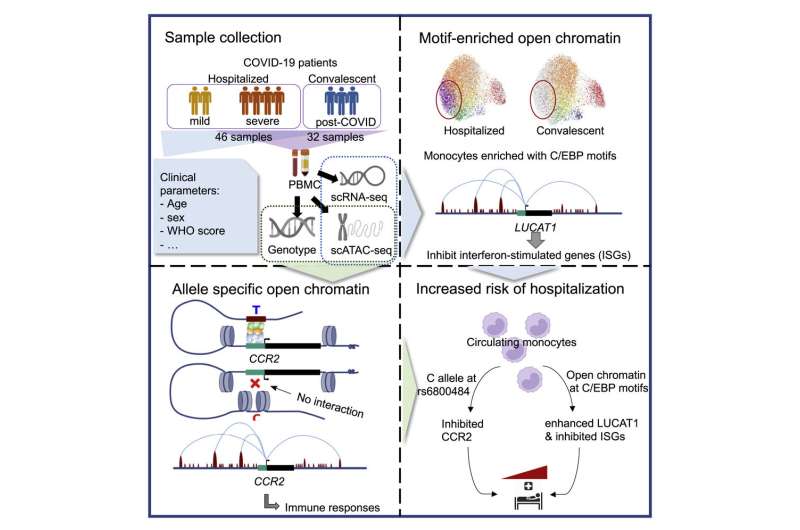This article has been reviewed according to Science X's editorial process and policies. Editors have highlighted the following attributes while ensuring the content's credibility:
fact-checked
proofread
Researchers analyze genetic and epigenetic regulators to understand severity discrepancies in COVID-19

Infection with SARS-CoV-2 leads to severe disease in some people, while others do not get ill or only experience mild symptoms. But why is this the case? Unfortunately, we do not know exactly. We do know that an overactive innate immune system is causing severe COVID-19 disease, but it is unclear how this is regulated.
A team led by Professor Dr. Yang Li from Hannover Medical School (MHH) has come a step closer to answering this question. They studied to what extent the course of disease is genetically or epigenetically regulated. The team included scientists from the MHH who, like Professor Li, also conduct research in the Cluster of Excellence RESIST.
The team was able to identify underlying regulators of the malfunctioning innate immune system in COVID-19. In addition, it was able to confirm that certain already known genetic risk factors play a role in the development of COVID-19. The results have been published in the journal Cell Genomics. First authors of this publication are Dr. Valerie Koeken, Dr. Bowen Zhang and Dr. Zhenhua Zhang. The research team conducted the study at the Center for Individualized Infection Medicine (CiiM).
For this study, the team examined individual immune cells from the blood of COVID-19 patients using single-cell multi-omics analysis. This technique can be used to simultaneously assess how cells are being regulated and how they are functioning. For this purpose, the genetic material of the cells is examined to determine whether certain parts of the genome are "switched on" (epigenetics) and if genes are being transcribed into ribonucleic acid molecules.
Using a specific type of white blood cells (monocytes), which are overactivated in severe COVID-19 disease, the team was able to identify how altered accessibility to chromatin is regulating gene expression and which transcription factors are steering these dysfunctional monocytes. In addition, they were able to identify how a specific genetic variant is contributing to a higher viral load and an increased risk of hospitalization for COVID-19. This enabled them to identify one of the factors driving increased susceptibility to severe disease in certain individuals. "Overall, our study highlights the multiple genetic and epigenetic regulators that contribute to COVID-19," says Prof. Li.
More information: Bowen Zhang et al, Altered and allele-specific open chromatin landscape reveals epigenetic and genetic regulators of innate immunity in COVID-19, Cell Genomics (2022). DOI: 10.1016/j.xgen.2022.100232





















